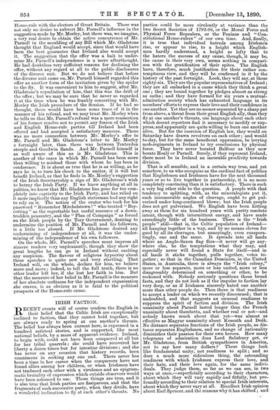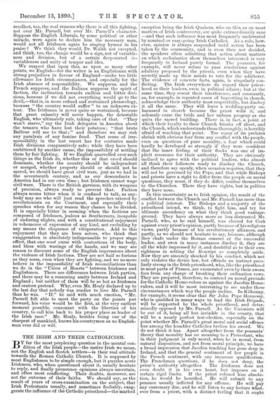IRISH FACTION. R ECENT events will of course confirm the English
in their belief that the Celtic Irish are exceptionally inclined to faction, that they cannot hold together, but are always ready to spring at one another's throats. The belief has always been current here, is expressed in a hundred satirical stories, and is supported, like most national beliefs, by a mass of apparent evidence. Ireland, to begin with, could not have been conquered at all but for her tribal quarrels ; she could have recovered her liberty a dozen times but for intestine divisions ; and she has never on any occasion that history records, been unanimous in seeking any one end. There never has been a time in her career when the conquerors have not found allies among her children, or when Irishmen have not traduced each other with a virulence and an epigram- matic brutality of expression which outside observers would have been ashamed to use. Those things are true, and it is also true that Irish parties are fissiparous, and that the fragments of each successive party, when they divide, have a wonderful inclination to fly at each other's throats. No parties could be more virulently at variance than the two Secret Societies of 1792-98, or the Moral Force and Physical Force Repealers, or the Fenians and " Con- stitutional Home-rulers " of our own time. And, finally, it is true that individual hatreds among Irishmen rise, or appear to rise, to a height which English- men hardly understand, a height so lofty that to the haters the success of any cause, though, it may be, the cause is their very own, seems nothing in compari- son with the gratification of their spites. The English have, therefore, much justification for their rather con- temptuous view, and they will be confirmed in it by the history of the past fortnight. Look, they will say, at these eighty-six. They are the popular representatives of Ireland ; they are all embarked in a cause which they think a great one ; they are bound together by pledges almost as strong as oaths ; and they have formed for six years a mutual- admiration society which has exhausted language in its members' efforts to express their love and their confidence in one another. Yet they are no sooner separated by a sharp pat from above, a threat from their great English ally, than they fly at one another's throats, use language about each other which decent reporters find it necessary to modify or sup- press, and apparently are quite willing to burn one another alive. But for the coercion of English law, they would on Saturday have drawn revolvers on each other; and would to-day, but for the same beneficent oppression, be levying mob-regiments in Ireland to try conclusions by physical force. They have never berated Balfour as they now berate Healy or Parnell. Surely, if they represent Ireland. there must be in Ireland an incurable proclivity towards division.
That is all sensible, and in a certain way true, and yet somehow, to us who recognise as the cardinal fact of politics that Englishmen and Irishmen have for the next thousand years or so to live together in partnership, it is no more completely convincing than it is satisfactory. There is such a very big other side to the question. A people with that tendency to splitting, with, as the mineralogists put it, such innumerable angles of cleavage, ought to get pul- verised under long-continued blows ; but the Irish people does not get pulverised. We English have been hitting away at them for six hundred years with pretty resolute intent, though with intermittent energy, and have made exceedingly little of the business. There is the " Irish people " still—that is, the Celtic population of Ireland— all hanging together in a way, and by no means cloven for good by all its cleavages, but annoyingly, even exaspera- tingly, one and the same. It spreads into all lands where an Anglo-Saxon flag flies—it never will go any- where else, be the temptations what they may, and especially never will found a State for itself—and in all lands it sticks together, pulls together, votes to- gether ; so that in the Canadian Dominion, in the United States, in Australia, there is always the " Irish colony," more or less separate, more or less united, more or less disagreeably determined on something or other, to be reckoned with. Nobody seriously questions those broad facts, and they do not look as if the impulse to faction lay very deep, or as if Irishmen sincerely hated one another more than other people do. Then there is that readiness to accept a leader on which we recently discoursed ; that is undoubted, and that suggests an unusual readiness to suppress the spirit of faction and division. The Irish unanimity about Parnell lasted longer than the French unanimity about Gambetta, and whether real or not—and nobody knows much about that yet—was almost as effective as Magyar unanimity about Kossuth and Defik. No distance separates fractions of the Irish people, as dis- tance separates Englishmen, and no change of nationality diminishes their passion for their own heroes. How many telegrams of admiration does Lord Salisbury get, or Mr. Gladstone, from British sympathisers in America, not to say how many dollars ? These things look like fundamental unity, not readiness to split ; and so does a much more ridiculous thing, the astounding readiness with which Irishmen express their love, and their hate, and their love again, for the same indivi- duals. They judge them, so far as we can see, in two ways at once,—superficially according to their characters, about which they will vary rapidly and fitfully, but pro- foundly according to their relation to special Irish interests, about which they never vary at all. Recollect Irish opinion about Earl Spencer, and the reasons why it has shifted ; and recollect, too, the real reasons why there is all this fighting, not over Mr. Parnell, but over Mr. Parnell's character. Suppose the English Liberals, by some political or other miracle, were again to declare him the necessary man, would not all Irishmen again be singing hymns in his praise ? We think they would, Dr. Walsh not excepted, and think, too, the change would be a sign, not of variable. ness and division, but of a certain deep-seated in- variableness and unity of temper and idea.
We suspect that upon this, as upon so many other points, we English—for the writer is an Englishman with strong prejudices in favour of England—make too little allowance for Irish circumstances, and especially for the Irish absence of responsibility. We suppress, and the French suppress, and the Italians suppress the spirit of faction, the inclination towards endless and bitter divi- sions, because if we did not everything would go to the devil,—that is, in more refined and restrained phraseology, because " the country would suffer " to an unknown ex- tent. The Irishman is never quite so restrained, because that great calamity will never happen, the detestable English, who ultimately rule, taking care of that. " They won't starve," say the Irish delegates in America, about the tenants who have lost their potatoes ; " that brute Balfour will see to that ; " and therefore we may risk any paralysis of any famine fund. That sense of irre- sponsibility in the last resort has for centuries made Irish divisions comparatively safe ; while they have been embittered by another cause, the impossibility of settling them by fair fighting. If we English quarrelled over such things as the Irish do, whether this or that creed should dominate, whether the country should be independent or merged, whether property should or should not be sacred, we should have great civil wars, just as we had in the seventeenth century, and as our descendants in America had in our own time ; but Irishmen cannot wage civil wars. There is the British garrison, with its weapons of precision, always ready to prevent that. Faction always seems bitter when it is confined to talk, as any- body may see who will just read the speeches uttered by revolutionists on the Continent, and especially their speeches when for any reason they chance to be divided. It is especially bitter in seeming when the factions are composed of Irishmen, jealous as Southerners, incapable of enduring slights, and with a constitutional enjoyment in vehemence of expression of any kind, not excluding by any means the eloquence of vituperation. Add to this enjoyment that they are born actors, who think that exaggeration is absolutely indispensable to proper stage effect, that one must curse with contortions of the body, and bless with wavings of the hands, and we may see reason to discount some of the English impressions about the violence of Irish factions. They are not half so furious as they seem, even when they are fighting, and we no more believe in the impossibility of Irish reconciliations than we do in the "Union of Hearts" between Irishmen and Englishmen. There are differences between Irish parties, and there may be a reasoning amity between Ireland and England ; but neither of them will be so hot as Irishmen and orators pretend. Why, even Mr. Healy declared up to the last day that nobody was readier to love Mr. Parnell than he was. " If," he said with much emotion, " Mr. Parnell felt able to meet the party on the points put forward, his voice would be the first, at the very earliest moment possible, consonant with the liberties of his country, to call him back to his proper place as leader of the Irish race." Mr. Healy, besides being one of the sharpest of mankind, knows his countrymen as no English- man ever did or will.











































 Previous page
Previous page